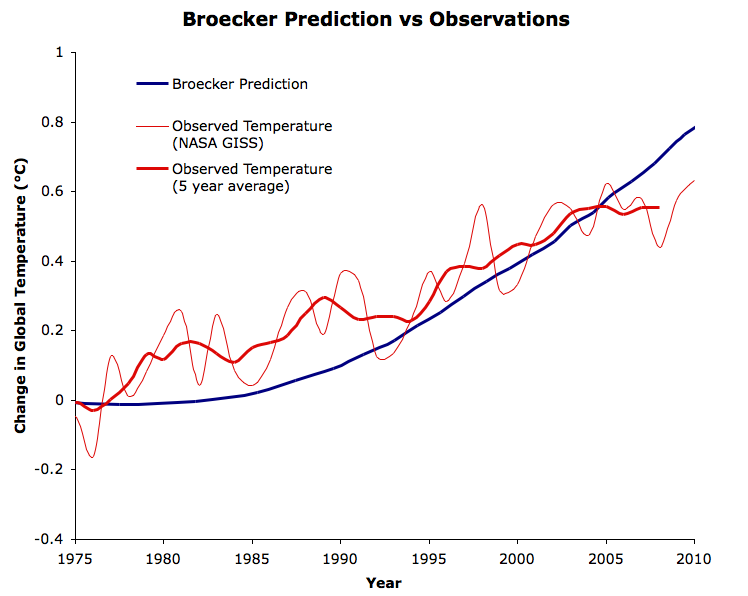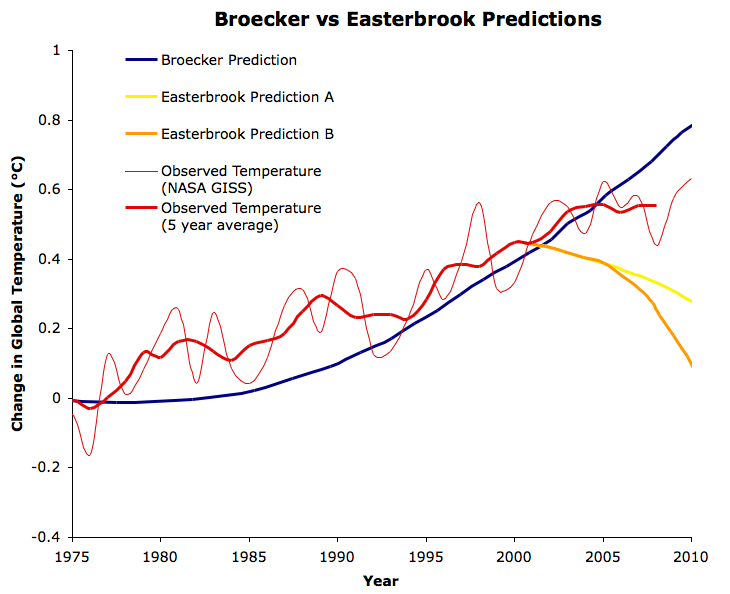Like a Fine Wine, Climate Science Ages Well
Posted on 15 July 2011 by dana1981
Although our understanding of the nuts and bolts of the Earth's climate has mainly evolved over the past few decades, scientists began to grasp the main components driving climate change over 150 years ago.
In laboratory experiments in 1859, British physicist John Tyndall first measured the greenhouse effect of carbon dioxide (CO2). A few decades later in 1896, Swedish scientist Svante Arrhenius calculated that if the amount of CO2 in the atmosphere were to double, the planet would warm 5-6°C, which is not far from today's estimates of 2-4.5°C. In 1956, Canadian-American physicist Gilbert Plass used the increasing power of digital computers at the time to confirm Arrhenius' theory, concluding that doubling atmospheric CO2 would cause 3-4°C global warming.
Modern climate science began to advance rapidly in the 1970s, as more scientists began conducting research in the field, and began creating simple climate models. American earth scientist Wallace Broecker was among the first climate scientists to use these simple climate models to predict future global temperature changes. His 1975 paper Climatic Change: Are We on the Brink of a Pronounced Global Warming? is widely credited with coining the term "global warming".
In that paper, Broecker modeled the effects of the expected future increase of CO2 due to humans burning fossil fuels, combined with a natural climate cycle which he estimated based on Greeland ice core records. As noted above, this is a very simple model, excluding the effects of the sun, volcanoes, other greenhouse gases, aerosols, and so forth, which Broecker acknowledged:
"In this report only the interaction of the CO2 effect and natural climatic change is considered. As other anthropogenic effects are shown to be significant and as means to quantitatively predict their future influence on global temperatures are developed, they can be included in models such as this."
As it turns out, Broecker has been fortunate, because the cooling effects of human aerosol emissions have roughly cancelled out the warming effects of human non-CO2 greenhouse gas emissions (i.e. methane and nitrous oxide) since 1975, and solar activity has been flat over that period. So the net effect of the factors which he did not take into account has been close to zero. However, Broecker was also smart; the dominant effect on temperature since 1975 has been from CO2, as he expected. It's better to be lucky than good, but it's best to be both.
Broecker anticipated the actual increase in CO2 very closely, and his calculation of the short-term warming effect in response to increasing CO2 was just a bit higher than the best estimate of today's climate scientists. In the figure below, we have compared his global temperature prediction to the observed global temperature change since 1975.
As you can see, Broecker's prediction has matched the net global temperature change quite closely over the past 35 years. His 'natural cycle' estimate held his prediction below the actual global temperature increase for most of the period, but he predicted its effects would approach zero after 2000. Not coincidentally, this is when his prediction most closely matches the observed global temperature. Broecker overestimated the amount of global warming by 2010 slightly, by a bit less than 0.2°C. This is probably mainly due to his slight overestimate of the short-term warming response to increasing CO2.
It's quite remarkable that a prediction made in 1975 using such a simple model of the climate system could so accurately match the observed global temperature change. It's a testiment to the dominant effect of CO2, and the fact that we have had a solid understanding of the fundamental workings of the Earth's climate for many decades.
Nevertheless, those who are "skeptical" that humans are driving global warming, including the few climate scientists in this category, often emphasize and exaggerate what we don't know about how the Earth's climate functions. In his testimony before US Congress earlier this year, "skeptic" climate scientist John Christy compared the state of climate science research in the 1970s to that today, saying "our ignorance about the climate system is just enormous".
While it's true that there remain some features of the climate system which we still don't fully understand, Broecker's success illustrates that climate scientists have long had a good grasp on the main drivers of the global climate.
While the "skeptics" enjoy criticizing climate scientists, they rarely put their money where their mouths are in terms of making predictions of their own. One of the exceptions, geologist Don Easterbrook has been predicting imminent global cooling since approximately 2000. He stood by that prediction in December 2008, presenting his projections of future global temperature change at the American Geophysical Union annual conference. Easterbrook's model is even simpler than Broecker's, only taking into account his estimates of past natural climate cycles, assuming they will continue in the future, and effectively presuming that CO2 has no effect on global temperatures (throwing out the centuries-old physics of Tyndall and Arrhenius). The figure below compares Broecker's prediction and two of Easterbrook's to the observed global temperature.
Broecker's 1975 prediction was within 0.2°C of the observed global temperature in 2010, while Easterbrook's, last made in December 2008, were off by 0.3 to 0.5°C. This illustrates the importance of basing future predictions on solid physical footing, and also shows that climate scientists understand the inner workings of the global climate much better than the "skeptics" would have us believe. In fact, in the 1970s, climate scientists understood how the Earth's climate works better than many "skeptic" scientists do in 2011!
So the next time a "skeptic" tells you how little we understand about the global climate, remind them about how much we do know and how accurate climate scientists' predictions have already been.































 Arguments
Arguments
































Comments